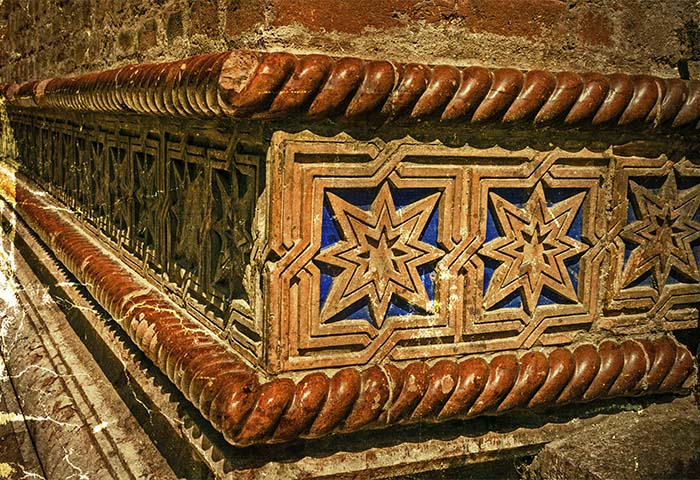Jewish Context
-
Holocaust Remembrance
Yom HaShoah (יום השואה)
Holocaust Remembrance Day, or Holocaust Day, is observed as Israel's day of commemoration for the approximately six million Jews who perished in the Holocaust as a result of the actions carried out by Nazi Germany and its collaborators, and for the Jewish resistance in that period. In Israel, it is a national memorial day. The first official commemorations took place in 1951.
Yom HaShoah opens in Israel at sundown in a state ceremony held in Warsaw Ghetto Square at Yad Vashem, the Holocaust Martyrs' and Heroes Authority, in Jerusalem. During the ceremony the national flag is lowered to half mast, the President and the Prime Minister both deliver speeches, Holocaust survivors light six torches symbolizing the approximately six million Jews who perished in the Holocaust and the Chief Rabbis recite prayers.
On Yom HaShoah, ceremonies and services are held at schools, military bases and by other public and community organizations. On the eve of Yom HaShoah and the day itself, places of public entertainment are closed by law. Israeli television airs Holocaust documentaries and Holocaust-related talk shows. Flags on public buildings are flown at half mast. At 10:00, an air raid siren sounds throughout the country and Israelis are expected to observe two minutes of solemn reflection. Almost everyone stops what they are doing, including motorists who stop their cars in the middle of the road, standing beside their vehicles in silence as the siren is sounded.
-
Jewish Identity
 Download this Topic
Download this Topic Download the Book
Download the BookThe Identity of Jewish People
Frequently, as I have had the opportunity to minister in various congregations, I have asked people, ‘What do you think it means to be Jewish?’ People tell me that being Jewish is being part of the chosen people. Or it is a person who has the Jewish religion. Or it is a person who does not believe in Jesus. People also respond in other ways. Even Jewish people have difficulty defining ‘What does it mean to be Jewish?’
In the field of Jewish evangelism, definitions and terminologies seem to facilitate an understanding of how we might effectively communicate the message of Messiah. Jewish people are referred to as: Jews, Jewish people, Hebrews, Israelites, descendants of Abraham, Isaac and Jacob, and the Chosen people. Some Christians even seek to boast that they have become the true Jews because of their circumcision of the heart through faith in Jesus.
-
The Jewish Calendar
 Download this Topic
Download this Topic Download the Book
Download the BookBasic Jewish Teaching: The Calendar
The Jewish calendar is really two calendars in one. The civil year and New Year begin in September, the month of Tishre. The religious year begins with the month of Nissan, March or April. The first month of the civil calendar falls on the seventh month of the religious calendar.
The present Jewish calendar is lunisolar, the months being reckoned according to the moon and the years according to the sun. A month is the period of time between one conjunction of the moon with the sun and the next. The number of days in a year in this Jewish lunar calendar is shorter than the number of days in the solar calendar. The lunar year consists of twelve months, or 354 days, approximately 10 days, 21 hours shorter than the solar calendar.
-
A Portrait of Jewish Americans
The 2013 Pew Research Center report is on Jewish Americans offers a fascinating and comprehensive portrait of the status and mind of Jewish America. Download the full report for further reading.
-
Eretz Israel
The Land of Israel
Meaning
For the past three thousand years, the name “Israel”, alluding to the patriarch Jacob; “persevere with God,” has meant both the Land of Israel and the entire Jewish nation.
Origin of the People
The people of Israel (also called the “Jewish People”) trace their origin to Abraham, who established the belief that there is only one God, the creator of the universe (see Torah). Abraham, his son Yitshak (Isaac), and grandson Jacob (Israel), are referred to as the patriarchs of the Israelites. All three patriarchs lived in the Land of Canaan, that later came to be known as the Land of Israel. They and their wives are buried in the Ma’arat HaMachpela, the Tomb of the Patriarchs, in Hebron.
-
Waiting for the Temple to Be Rebuilt
'Reunion' of Priests Spurs Talk of Third Temple
Just days before the holiday of Tisha B'Av that commemorates the destruction of the Holy Temples, a group of Jewish priests and Levites hurried across the centuries-worn cobblestones of this holy city to prepare to bless the people of Israel.
They gathered at the foot of the Holy Temple's last remaining wall, the priests removing their shoes and extending their hands for the Levites to wash in preparation for the holy service.
-
Messianic Jews and the Law in Israel
Two Important Cases for Israeli Messianics: A Legal Analysis
The decisions revealed the opinion of the Israeli government towards the Messianic Jewish community, and exposed the passive and non-political attitude of the Messianic community.
Two very important court decisions have recently been issued in Israel, in which several very positive results emerged regarding the depicted opinion of the Israeli government towards the Messianic Jewish community. Furthermore, these court decisions expose the passive and non-political attitude which is prominent in the Messianic community and which indicates that this community is a minority group that is entitled to receive the court's protection.
-
Messianic Jews and the Law of Return
A Messianic Legal Analysis
The nation of Israel has the right to define itself as a Jewish nation and the definition given, as of today, is that a Messianic Jew is not considered Jewish for the purposes of the "Law of Return."
The Messianic Jewish community claims that it is another stream within Judaism that is resurrecting after 2,000 years of silence. The Messianic Jewish community explains its legitimacy by historical and theological claims. Theologically, Messianic Jews claim that Yeshua is really the promised Messiah according to the Messianic prophecies revealed in the Jewish scriptures, and historically they claim that all the first followers of Yeshua were devout Jews. With the establishment of the Jewish nation, many Jewish people have been convinced that Yeshua is truly the Messiah according to the Jewish scriptures and have consequently begun to believe in Yeshua, while insisting on keeping their Jewish identity.





